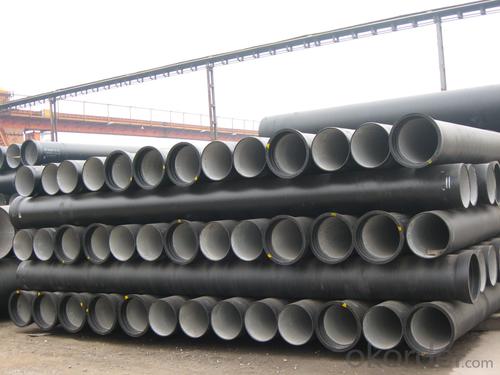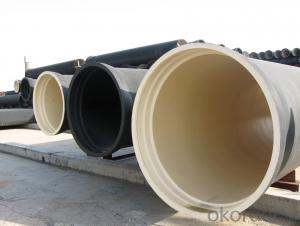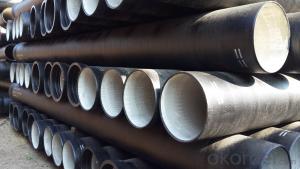Ductile Iron Pipe DN350
OKorder Service Pledge
Quality Product, Order Online Tracking, Timely Delivery
OKorder Financial Service
Credit Rating, Credit Services, Credit Purchasing
You Might Also Like
Specifications
Quick Details
| Place of Origin: | China (Mainland) | Brand Name: | CMAX | Model Number: | T type / K type / Flange type |
| Length: | 6m / 5.7m / Negotiable | Standard: | ISO2531 / EN545 / EN598 | Application: | Potable / Sewage water |
| Diameter: | DN80~DN2200 | Shape: | Round | Hardness: | 230 |
| Pipe Wall Thickness: | standard | Pull Strength: | 420 | Yield (≥ MPa): | 300 |
| Material: | Ductile Iron | Type: | Centrifugal ductile cast iron pipe | Certification: | ISO2531 / EN545 / EN598 |
| Outer Diameter: | 80-2200 | Thickness: | standard | Specification: | DN80~DN2200 |
| |
The advantages to the customer:
Trustworthy financial strength.
One-stop shopping.
Fast and efficient service.
Coordination of shipments from multiple plants.
Specialists of the overseas shipping process.
A more competitive price.
- Q: The difference between flexible joint cast iron pipe and flexible anti-seismic cast iron pipe
- Nodular cast iron pipes and fittings technical manual PDF download Fan Yingjun handsome date: Author: fan manufacturing technology, in January 2006, this book introduces the ductile iron pipe interface form, quality standard, installation technology and special use of ductile cast iron pipe and other content, lists all the technical parameters for ductile iron pipes, pipe fittings interface in order to facilitate the readers to use and accessories
- Q: How are ductile iron pipes protected against internal corrosion?
- Ductile iron pipes are protected against internal corrosion through a process called cement mortar lining. This involves applying a layer of cement mortar to the inner surface of the pipe, creating a protective barrier between the iron and the water flowing through it. This lining helps to prevent the formation of rust, corrosion, and scale build-up, ensuring the longevity and durability of the pipes.
- Q: Can ductile iron pipes be used for slurry transportation?
- Yes, ductile iron pipes can be used for slurry transportation. Ductile iron pipes are known for their strength and durability, which makes them suitable for transporting various types of fluids, including slurry. They have the ability to withstand the abrasive nature of slurry and can effectively handle the pressure and flow requirements associated with slurry transportation.
- Q: How do ductile iron pipes perform in extreme weather conditions?
- Ductile iron pipes have excellent performance in extreme weather conditions. Their high tensile strength and flexibility allow them to withstand freezing temperatures, heavy snow loads, and extreme heat without cracking or breaking. Additionally, their corrosion-resistant properties make them highly durable and reliable in harsh weather environments, ensuring long-term performance and minimal maintenance requirements.
- Q: Can the underground cast iron pipes be connected with clamps to form buttress?
- The clamp hoop is a connecting device for connecting pipe fittings, valves and pipe fittings with grooves. Used in the fast joint between the role of tightening, the general two joints with gaskets, rubber, and silicone, ptfe.
- Q: Are there any alternatives to ductile iron pipe for water distribution?
- There are various options available for water distribution besides ductile iron pipe. Some commonly used alternatives include: 1. PVC (Polyvinyl Chloride) Pipe: PVC pipe is frequently chosen for water distribution due to its affordability, durability, and resistance to corrosion. It is lightweight, easy to install, and requires minimal maintenance. 2. HDPE (High-Density Polyethylene) Pipe: HDPE pipe is a flexible and durable choice for water distribution. It is resistant to corrosion, chemicals, and UV rays, making it suitable for both aboveground and underground installations. HDPE pipe is also known for its leak-free joints and long lifespan. 3. PEX (Cross-linked Polyethylene) Pipe: PEX pipe, a flexible plastic pipe, is commonly utilized for water distribution in residential and commercial settings. It is recognized for its ability to withstand freezing, scaling, and corrosion. PEX pipe is easy to install, has fewer joints, and is highly durable. 4. Copper Pipe: Copper pipe has a long history of use in water distribution due to its exceptional resistance to corrosion and extended lifespan. Although it is more expensive than other alternatives, copper pipe is renowned for its reliability and ability to handle high pressure. 5. Steel Pipe: Steel pipe is a robust and durable option for water distribution, particularly in high-pressure scenarios. It can endure extreme temperatures and resist external loads. However, steel pipe is more costly and requires specialized installation techniques. When selecting an alternative to ductile iron pipe for water distribution, it is crucial to consider factors such as cost, durability, corrosion resistance, installation requirements, and specific project needs.
- Q: What are the different joint types available for ductile iron pipes?
- Ductile iron pipes offer various joint types that are essential for maintaining the integrity and reliability of the pipeline system. 1. The push-on joint is the most prevalent joint used for ductile iron pipes. It involves inserting a rubber gasket into the bell end of the pipe and then pushing the spigot end into the bell, ensuring a tight seal. This joint is easy to assemble, quick, and has excellent resistance against soil movement and water pressure. 2. The mechanical joint involves a gland and follower that are secured around the spigot end of the pipe using bolts and nuts. It provides a robust and durable connection and is commonly used for larger diameter pipes or applications that expect higher pressure or thrust loads. 3. Flanged joints are utilized when connecting pipes to other components like valves or fittings. The pipe ends are machined and equipped with flanges that are bolted together using gaskets, ensuring a secure connection. These joints find frequent use in industrial applications or situations requiring frequent disassembly. 4. Restrained joints are designed to withstand significant external forces and prevent separation or pulling apart of the pipe. They typically combine mechanical joint components, such as bolts and glands, with additional restraining elements like welded or bolted-on restraints. These joints are commonly employed in high-pressure applications or situations where substantial external forces are present. Choosing the appropriate joint type is crucial and depends on factors such as pipeline design, operating conditions, and installation requirements. Seeking guidance from experienced engineers or pipe manufacturers can aid in determining the most suitable joint type for a specific ductile iron pipe application.
- Q: Can ductile iron pipes be used for underground chemical processing systems?
- Ductile iron pipes are generally not recommended for use in underground chemical processing systems due to their limited resistance to corrosion from various chemicals. While ductile iron pipes are known for their strength, durability, and flexibility, they are still vulnerable to corrosion when exposed to certain chemicals, especially those with high acidity or alkalinity. In underground chemical processing systems, there is a higher risk of exposure to corrosive substances that can deteriorate the ductile iron pipes over time. This can lead to leaks, cracks, and failures in the piping system, compromising its integrity and potentially causing hazardous conditions. For underground chemical processing systems, it is advisable to consider alternative materials that are more resistant to corrosion, such as stainless steel, PVC, or high-density polyethylene (HDPE) pipes. These materials offer superior chemical resistance and can withstand the harsh conditions typically present in chemical processing environments. It is crucial to consult with experts in chemical engineering, piping design, and corrosion resistance to determine the most suitable materials for underground chemical processing systems. Proper material selection is vital to ensure the longevity and safety of the piping infrastructure in such environments.
- Q: How do ductile iron pipes perform in high-temperature steam applications?
- Ductile iron pipes perform well in high-temperature steam applications due to their excellent heat resistance and mechanical strength. They have the ability to withstand the high temperatures and pressures typically found in steam systems without experiencing significant deformation or failure. Additionally, their corrosion resistance properties make them a reliable choice for such applications.
- Q: Can ductile iron pipes be used for river crossings?
- Yes, ductile iron pipes can be used for river crossings. Ductile iron is a strong and durable material that can withstand the stresses and pressures of being installed underground and crossing rivers. It is commonly used in water and sewage systems, including river crossings, due to its resistance to corrosion and its ability to handle high water pressure.
Send your message to us
Ductile Iron Pipe DN350
OKorder Service Pledge
Quality Product, Order Online Tracking, Timely Delivery
OKorder Financial Service
Credit Rating, Credit Services, Credit Purchasing
Similar products
Hot products
Hot Searches
Related keywords

























